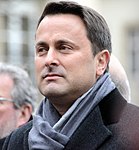Luxembourgian legislative election, 2013
|
|
|||||||||||||||||||||||||||||||||||||
|---|---|---|---|---|---|---|---|---|---|---|---|---|---|---|---|---|---|---|---|---|---|---|---|---|---|---|---|---|---|---|---|---|---|---|---|---|---|
|
|||||||||||||||||||||||||||||||||||||
|
|
|||||||||||||||||||||||||||||||||||||
|
All 60 seats of the Chamber of Deputies. 31 seats needed for a majority |
|||||||||||||||||||||||||||||||||||||
|
|||||||||||||||||||||||||||||||||||||
|
|||||||||||||||||||||||||||||||||||||
Early general elections were held in Luxembourg on 20 October 2013. The elections were called after Prime Minister Jean-Claude Juncker, at the time the longest serving head of government in the European Union, announced his resignation over a spy scandal involving the Service de Renseignement de l'Etat (SREL). The review found Juncker deficient in his control over the service.
The elections saw Juncker's Christian Social People's Party lose three seats, but remain the largest party in the Chamber of Deputies with 23 of the 60 seats.
After a spy scandal involving the SREL illegally wiretapping politicians, the Grand Duke and his family, and allegations of paying for favours in exchange for access to government ministers and officials leaked through the press, Prime Minister Juncker submitted his resignation to the Grand Duke on 11 July 2013, upon knowledge of the withdrawal of the Luxembourg Socialist Workers' Party from the government and thereby losing its confidence and supply in the Chamber of Deputies. Juncker urged the Grand Duke for the immediate dissolution of parliament and the calling of a snap election.
...
Wikipedia



